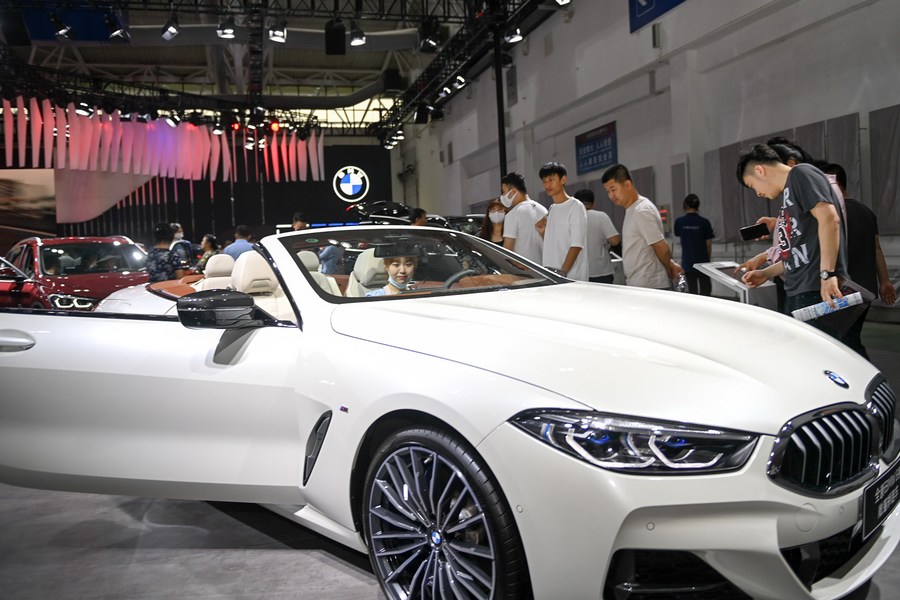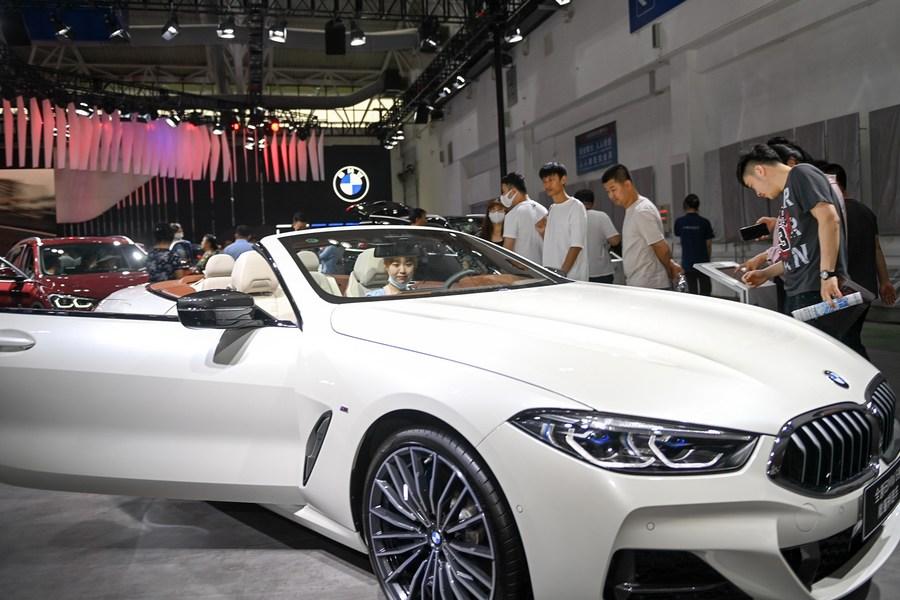
People visit the 18th China (Changchun) International Auto Expo in Changchun, capital of northeast China's Jilin Province, July 9, 2021. (Xinhua/Yan Linyun)
BEIJING, Jan. 6 (Xinhua) -- As one of the most dynamic and promising mobility markets in the world, China, in both terms of sales and production, is attractive to foreign auto companies to further increase long-term investment, which helps the country's auto industry to better interact with the world, promoting high-quality development of the sector.
-- Foreign auto firms confident in China's NEV sector
Since the beginning of 2022, global automakers such as Audi, General Motors, Volkswagen, BMW and so on, have strengthened their expansion efforts in the Chinese market, elevating direct investment and launching a number of new energy vehicle (NEV) and other related projects.
The Audi FAW NEV project, with a total investment of around 35 billion yuan (about 5.08 billion U.S. dollars), broke ground on June 28 in Changchun, capital city of northeast China's Jilin Province. With a planned annual production capacity of 150,000 vehicles, the project is Audi's first production base for purely electric vehicles in China and is expected to start operation by the end of 2024.
In October 2022, Toyota broke ground for the first phase of a fuel cell R&D and production base in Beijing, marking an important strategical move of the company's efforts of introducing and promoting hydrogen fuel cell technology in China.
Germany's BMW Group announced in November 2022 to invest some 10 billion yuan to support the expansion of its power battery production project in Shenyang, capital of northeast China's Liaoning Province, signaling that the city has become BMW's largest production base in the world.
On December 28, 2022, a new Ultium plant of SAIC General Motors (SAIC-GM) was put into operation in central China's Wuhan, following the company's first factory of such which was launched in October 2021 in Shanghai. "The new factory is a key project of SAIC-GM in the smart EV sector with an investment of 70 billion yuan. The SAIC-GM Wuhan Ultium Center will power the high-quality production of batteries and motor systems featuring Ultium technology," said Wang Yongqing, general manager of SAIC-GM.
In addition to investing in the manufacturing end, foreign automakers are also ramping up their efforts in innovation and technology. Volkswagen Group in October announced to invest about 2.4 billion euros (about 2.55 billion U.S. dollars) in the establishment of a joint venture between its subsidiary Cariad and Chinese AI chipmaker Horizon Robotics. The partnership is expected to strengthen Volkswagen's R&D capabilities and competitiveness in China, driving the transformation of its local business, according to a representative with the company.
-- Advantages in sales and production form continuous appeal
From January to November 2022, about 24.63 million cars were produced in China and 24.3 million were sold, up 6.1 and 3.3 percent year on year, respectively. Among the total, NEV production and sales exceeded 6.25 and 6.06 million units respectively, doubling the same-period level in 2021, according to the China Association of Automobile Manufacturers (CAAM).
China has been positioned as the world's largest market for new energy and intelligent connected vehicles for several consecutive years, said Xu Haidong, deputy chief engineer of CAAM, noting that foreign auto companies should enter the Chinese market for further development, as China is also the world's largest NEV producer with a complete supply chain system.
With years of policy support, China's domestic NEV brands have emerged with quite a few popular models that are capable of driving market growth. Besides, China has cultivated a large group of NEV consumers who generally have high acceptance of new technology and experience, which not only promotes the technological and conceptual innovation of domestic NEVs, but generates strong attraction for R&D investment of foreign auto enterprises in China, according to Xu.
By establishing their own industrial chain layout in China, foreign investors can effectively reduce their production costs by relying on China's technological advantages and improve their own competitiveness by utilizing China's advantages, said Cui Dongshu, secretary-general of the China Passenger Car Association.
"Taking BMW as an example, with one third of its global sales registered in China, the profits it made in the Chinese market can, in return, increase the company's investment capacity and industrial competitiveness back in Europe," Cui said.
On the demand side, China is a multilevel world market with huge potential for growth, whereas on the supply side, China is a world factory supported by stable industrial and supply chains, said Zhang Xiaotao, dean of the school of international economics and trade at Central University of Finance and Economics.
With diverse and constantly upgrading consumer demands, China's remarkable market size and consumption potential constitute a driving force for sustainable optimization of the supply system and a basis for continuous emergence of investment hot spots, according to Zhang.
-- Market competition optimized through industry opening-up
At the end of 2021, China unveiled a shortened negative list for foreign investment, which removes foreign ownership caps on passenger car manufacturing companies starting from January 1, 2022, marking the achievement of complete opening-up of China's auto industry.
Comprehensive development coordinating domestic and foreign investment is one of the important experience of China's development so far, Cui pointed out. Opening-up of China's auto industry provides the sector with a sufficient competition environment at a larger scale, which generates positive technology sharing and helps Chinese carmakers to gain larger comprehensive advantages in the global market, according to Cui.
The conclusion can be drawn from existing research that foreign investment is beneficial to China's economic development, said Zhang, highlighting that the infusion of foreign investment into the high-capital and high-tech manufacturing industry has promoted the rapid development of China's high-end manufacturing industry.
As an important link between domestic and international markets, foreign-invested enterprises contribute to employment, tax revenue, import and export, and play an important role in bridging the domestic and international economy, Zhang added.
China's opening-up policy has always been to welcome foreign investment to participate in China's construction and share the achievements of China's development. "We hope to make full use of foreign investment on the basis of equality and fairness, as well as build a more reasonable competitive environment, in a bid to ultimately promote the sound development of auto industry and bring greater benefits to consumers," Xu said.
(Edited by Yu Huichen with Xinhua Silk Road, yuhuichen@xinhua.org)




 A single purchase
A single purchase









